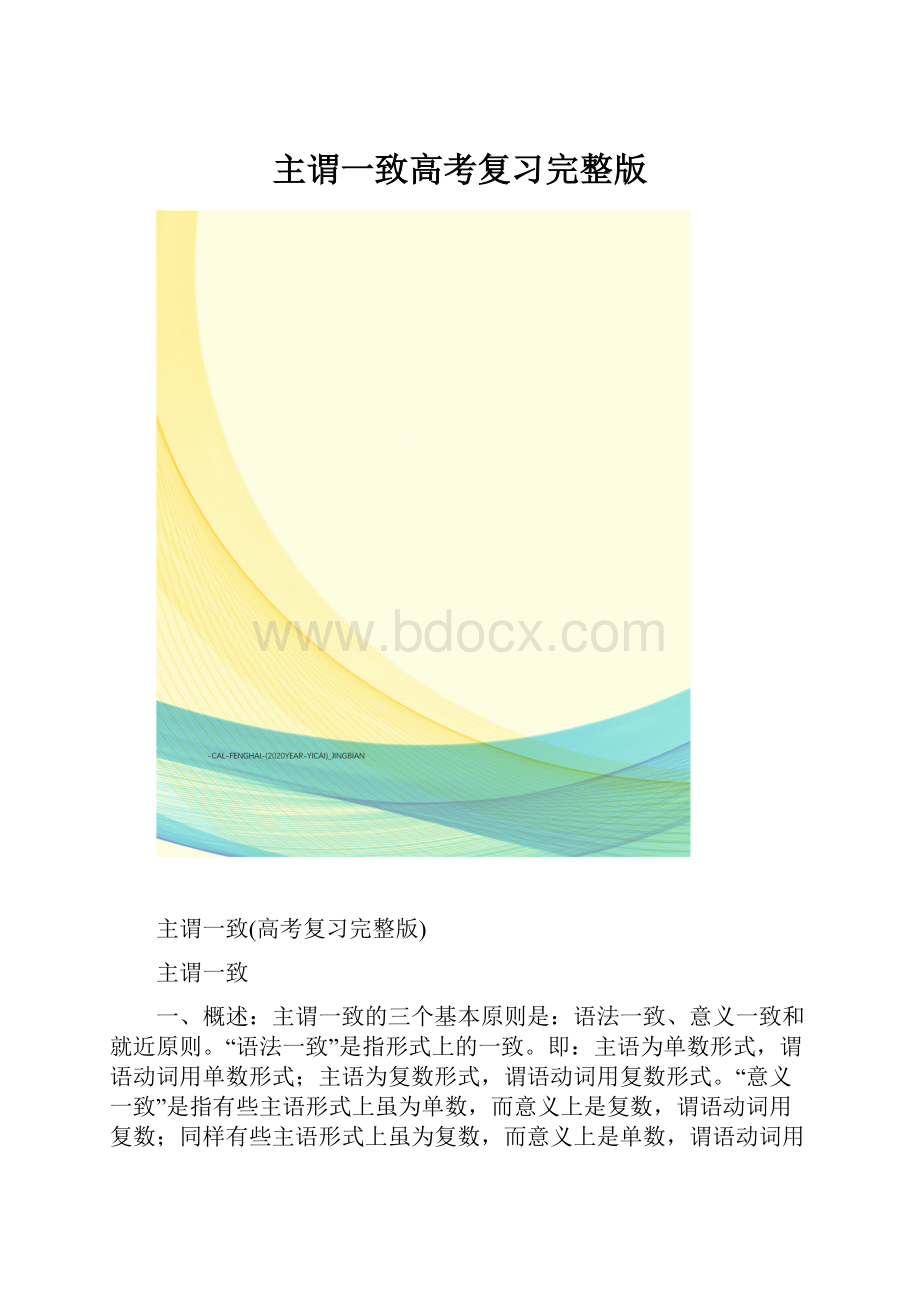主谓一致高考复习完整版.docx
《主谓一致高考复习完整版.docx》由会员分享,可在线阅读,更多相关《主谓一致高考复习完整版.docx(14页珍藏版)》请在冰豆网上搜索。

主谓一致高考复习完整版
主谓一致(高考复习完整版)
主谓一致
一、概述:
主谓一致的三个基本原则是:
语法一致、意义一致和就近原则。
“语法一致”是指形式上的一致。
即:
主语为单数形式,谓语动词用单数形式;主语为复数形式,谓语动词用复数形式。
“意义一致”是指有些主语形式上虽为单数,而意义上是复数,谓语动词用复数;同样有些主语形式上虽为复数,而意义上是单数,谓语动词用单数。
“就近原则”是指谓语动词的单复数与最靠近它的名词或代词保持一致。
二、主谓一致的几种情况:
(一)并列结构作主语的情况:
1、and连接并列成分作主语的情况:
⑴由and或both…and…连接的并列成分作主语时,谓语动词常用复数。
如:
HeandIareteachers.BothheandIareteachers.
⑵and连接的两部分表示同一个人、事物或概念时,谓语动词用单数。
常见结构有:
acartandhouse(一驾马车),acupandsaucer(一套杯碟),aneedleandthread(针线),awatchandchain,acoatandtie,truthandhonesty,medicalhelpandcure,myhouseandhome(我的家),causeandeffect(因果),supplyanddemand(供求关系),penandink(笔墨),whiskyandsoda(威士忌和苏打,指一种酒),warandpeace(战争与和平),aknifeandfork(刀叉),fishandpotatochips(鱼和炸土豆条),thebreadandbutter(面包与黄油),earlytobedandearlytorise(早睡早起)。
如:
Aknifeandforkisonthetable.
⑶由and连接两个带the(a或物主代词)的单数可数名词作主语时,谓语动词用复数;如果只有前一个名词带the(a或物主代词)时,谓语动词用单数。
如:
TheteacherandthedoctorareChinese.TheteacheranddoctorisaChinese.这位教师兼医生是中国人。
⑷and前后均有each,every,no,manya…等修饰可数名词单数,构成并列成分作主语时,谓语动词用单数。
其中后一个限定词可以省略。
如:
Nosoundand(no)voiceisheard.Eachmanand(each)womanishere.
Manyateacherand(manya)studenthasseenthefilm.
⑸由“and连接的前置并列修饰语+不可数名词”作主语时,谓语动词用复数。
如:
Goodandbadmeatinthemarketaresoldout.
⑹“不可数名词+and连接的后置并列修饰语”作主语时,谓语动词用单数。
如:
BeerfromtheUSAandGermanyismuchbetterthanthatfromBritain.
⑺由and连接的第二个名词(短语)表示否定或带有状语时,谓语动词与第一个名词保持一致。
如:
Theparentsandnotthesonweremissing.Theteacher,andperhapshisstudentstoo,islikelytobepresent.
⑻what从句的并列式作主语时,并列完整式用复数;并列缩略式用单数。
如:
Whathesaysandwhathethinkshavenothingtodowithme.WhatIsayanddoismyownaffair.
注意这两句根据的是意义一致的原则:
Whathesaysanddoesdonotagree.他言行不一致。
Whathesaysanddoesdoesnotconcernme.他的言行与我无关。
⑼由and连接的两个疑问代词、不定式或动名词作主语时,根据主语表达的意义,确定谓语动词单复数形式(即意义一致原则)。
如:
Whereandwhentobuildthehouseisnotdecided.Whentohavethemeetingandwhotoholdthemeetingarenotdecidedyet.Whatcausedthefireandhowmuchthelosswasarestillunknown.
2、“就近原则”:
由并列连词or,nor,notonly…butalso…,not…but…,either…or…,neither…nor…,whether…or…等连接并列成分作主语,以及在there/herebe句型中有并列成分作主语时,谓语动词应根据“就近原则”(在疑问句或倒装句中也应该根据“就近原则”确定谓语动词的单复数)。
如:
NotonlyhebutalsoIamateacher.NotonlyIbutalsoheisateacher.IsnotonlyhebutalsoIateacher?
Oneortwofriendsarecomingthisevening.
3、“就前原则”:
当主语后面接with,together/alongwith(跟……一起),aswellas(以及),asmuchas(与……一样多),such…as…,suchas,besides/except/but(除外),inadditionto(除外),including(包括),like(如),ratherthan(而不是),without(没有),nolessthan(不少于),morethan(多于),combinedwith(加上……),accompaniedby(由……陪同),nolessthan等构成的短语修饰时,谓语动词仍与前面的主语保持一致(即“就前原则”)。
如:
Iaswellastheyamreadytohelpyou.Tomaswellastwoofhisfriendswasinvitedtotheparty.TheyexceptJimareChinese.
(二)单一成分作主语的情况(一般情况下主语的人称和数决定谓语动词的单复数形式)。
1、名词作主语的情况:
⑴形复义单的名词。
这类名词有news,means(方法),works(工厂),plastics(塑料),politics(政治),mathematics(数学),economics(经济学),mechanics(力学),athletics(运动),electronics(电学),classics(古典文学),linguistics(语言学),statistics(统计学)等作主语时,谓语动词用单数;但当这类学科名词表示“具体的活动,学业,见解,原理,情况”等时,谓语动词用复数。
如:
Politicsismyweaksubject.Whatarehispolitics他的政见如何
⑵形复义复的名词。
这类名词有glasses,trousers/plants(裤子),shoes,socks,gloves,scissors,clothes,savings(储蓄金),belongings(财产),goods(货物),chopsticks,compasses(圆规)等作主语时,谓语动词用复数;但当这些名词前带上了单位词pair,kind,type,sort,suit,series等时,谓语动词的数应与单位词保持一致。
如:
Histrousersarenew.Thispairoftrousersisnew.
⑶集合名词作主语。
①有些集合名词作主语,谓语动词常常用复数。
这类名词有people(人们),police(警察),cattle(牲口),oxen(牛),folk(人们),youth(青年人),militia(民兵),poultry(家禽),theGreens(格林一家)等。
但注意如果以上一些名词的意义发生变化时,其谓语动词不一定用复数形式。
如:
Poultryareusedasfood.(家禽常常用来当作食品)Poultryisakindofmeat.(禽肉是一种肉)
②某些集合名词作主语,如果当作整体看待,谓语动词用单数;如果强调其中的各个个体或成员,谓语动词用复数。
这类名词有family,class,group(小组),grade,team,army(军队),club(俱乐部),audience(听众),crew(全体人员),committee(委员会),company(公司),government(政府),union(联合会),enemy(敌人),majority(多数),population,staff(员工),public(公众),crowd(人群),party(政党),couple(夫妇),band(伙、团、队),cabinet(内阁),nation(国民)等。
如:
Hisfamilyispoor.HisfamilyareallwatchingTV.
⑷单复数同形的名词作主语。
根据上下文及具体意思决定谓语动词的单复数形式(如果这些名词前有a,sucha,this,that修饰时,谓语动词用单数;如有all,such,these,those修饰时,谓语动词用复数。
)如sheep,deer,fish(鱼),means(方法),works(工厂),species(种类),series(系列),swine(猪),aircraft(飞机、飞艇),bellows(风箱),crossroads(十字路口),headquarters(司令部、总部),Swiss(瑞士人),Chinese,Japanese等。
如:
Asheepis(Severalsheepare)overthere.
⑸专有名词(如书刊名、报纸、国名、山脉、海峡等)作主语时,谓语动词用单数。
如:
TheUnitedNationswasfoundedin1945.
⑹名词所有格表示“商店、工厂或住宅”作主语时,谓语动词用单数。
但指“店铺”时,一般当集合名词看待,谓语动词用复数。
这类名词有thebaker's(烤房,面包房),thebarber's(理发店),thecarpenter's(木工房),theGreen's(格林先生的家)等。
如:
Thedoctor'sisontheothersideofthestreet.Smith'shavealotofthingstosell.(史密斯的店铺里有许多东西卖。
)
⑺名词化结构“the+形容词/过去分词/动词-ing”作主语时,谓语动词常用复数;但如果指“一个人”或“抽象的一类事物概念或品质”时,谓语动词用单数。
这类词有theold,theyoung,thewounded,thedying等。
如:
Theblindstudyinspecialschools.Thebeautifulgivespleasuretoallofus.(美给我们大家以快乐。
)
⑻某些以-ch,-ese,-sh结尾的表示国家、民族的形容词与the连用表示“整个民族”,作主语时谓语动词用复数;但当它们表示“某种语言”时,谓语动词用单数。
如:
TheChinesearegreat.Chineseisverydifficultforforeignerstolearn.
⑼表示量的名词作主语,要根据其具体含义确定谓语动词的单复数形式。
这类词有half(一半),(a)part(一部分),plenty(大量),therest(其余的人或物),thefollowing(下面的人或物)等。
如:
Ihavedrunksomeofthewaterandtherestisforyou.Thefirsttwoofthefourbooksareveryeasy,buttherestareverydifficult.
2、代词作主语的情况:
⑴不定代词each,one,much,either,neither,another,theother(+单数名词),(a)little等作主语或修饰主语时,谓语动词用单数。
如:
Eachofthestudents/Eachstudenthasanewbook.
注意当each位于复数主语后面作同位语时,谓语动词用复数。
如:
Thestudentseachhaveanewbook.
⑵复合不定代词someone,somebody,something,anyone,anybody,anything,everyone,
everybody,everything,noone,nobody,nothing作主语时,谓语动词用单数。
注意:
表示人的复合不定代词作主语,变反意疑问句时常常用复数代词;表示物的复合不定代词作主语,变反意疑问句时常常用单数代词。
如:
Someonewantstoseeyou,don'tthey
Everythingisready,isn'tit?
⑶不定代词many,(a)few,several,both等作主语或修饰主语时,谓语动词用复数。
如:
Both(ofthebooks)areinteresting.
⑷不定代词all,none,any,some,more,most,alot(of),lotsof等作主语或修饰主语时,谓语动词应根据其指代或修饰的名词的数确定单复数形式。
如:
Noneofushasseenthefilm.(我们中没有一个人看过这部电影。
)Noneofushaveseenthefilm.(我们所有的人都没有看过这部电影。
)
⑸疑问代词who,whose,which,what等作主语时,谓语动词应根据说话人的意图确定单复数。
如:
Whoaretoday'stopicsWholivesnextdoorIt'sJim.
⑹指示代词such,thesame,bellow,thefollowing等作主语时,谓语动词应根据其内容(表语)确定单复数。
如:
Suchislife.Sucharehiswords.
⑺关系代词that,which,who等在定语从句中作主语时,谓语动词的数应与句中先行词的数一致。
注意:
“oneof+复数名词+who/that/which”型定语从句,复数名词是先行词,故定语从句的谓语动词用复数;但是,如果one前有this,that,the,thevery,theonly等修饰时,one是先行词,故定语从句的谓语动词用单数。
如:
Thosewhowanttogopleasesignyournamehere.Hewasoneoftheboyswhowerepraised.Hewastheonlyoneoftheboyswhowaspraised.
⑻名词性物主代词作主语时,谓语动词应根据其指代的内容确定单复数。
如:
YourPartyisagreatparty,ours(OurParty)isalsoagreatparty.Yourshoesareblack,mine(myshoes)arewhite.
3、数词作主语:
⑴“四则运算”的数词作主语时,谓语动词通常用单数(若是“加法”或“乘法”,谓语动词也可以用复数)。
如:
Twoandthreeis/arefive.Twelvedividedbythreeisfour.
注意:
当提问加、减、乘、除时,如用howmuch,谓语动词多用单数;如用howmany,谓语动词多用复数。
如:
HowmuchisfourtimestwoHowmanyaretwotimesfive
⑵“分数和百分数”构成的短语作主语时,谓语动词应根据of后的名词确定单复数。
如:
Only20percent/Twofifthsofthebooksareworthreading.
⑶表示“时间、距离、价格、金额、、长度、重量、量度、温度”等的数词作主语,谓语动词通常用单数形式;但侧重于“若干单位”时,谓语动词用复数。
如:
Twentyyearsisn’talongtime.Twothousandpoundsisalargesum.Twentyyearshavepassedsinceheleft.(他离开已经二十个年头了)
⑷当主语被表示“单位、度量”的短语修饰时,谓语动词由表示“度量”的名词的单复数确定。
这类短语有akindof,asortof,atypeof,apairof,atonof,acupof,ameterof,abottleof,ahandfulof(一把……),aglassof,apieceof,aboxof,aformof,aquantityof等。
如:
Hereisapairofshoes.Threemilliontonsofcoalexportedeveryyear.
⑸当主语被以下短语修饰时,谓语动词的单复数由of后面的名词的单复数决定。
这类短语有plentyof,alotof/lotsof,halfof,mostof,therestof,theremainder(剩余的,剩下的),someof,aheapof/heapsof(许多的、大量的)。
如:
Lotsofmoneyisneeded.Lotsofpeoplearewaitingoutside.
⑹几种特殊结构:
Thenumberof+复数名词+单数谓语Thenumberofthestudentsinourclassis65.
①Anumberof+复数名词+复数谓语AnumberofthestudentsareLeaguemembers.
Numbersof+复数名词+复数谓语NumbersofthestudentsareLeaguemembers.
Manya+单数名词+单数谓语ManyagoodfriendofminehasbeentoBeijing.
②
Agood(great)many+复数名词+复数谓语Agoodmanystudentsarepresentatthemeeting.
A/An+单数名词+ortwo+单数谓语Adayortwoisenough.
③
Oneortwo+复数名词+复数谓语Oneortwopersonsaren’tenough.
A/An+单数名词+andahalf+单数谓语Ayearandahalfhaspassed.
④
Oneandahalf+复数名词+复数/单数谓语Oneandahalfyearshave/haspassed.
Morethanone+复数谓语Therearesomeboysthere,morethanoneareChinese.
Morethanone+单数名词+单数谓语Morethanonepersonwasabsent.
⑤More+复数名词+thanone+复数谓语Morestudentsthanonehavebeenthere.
Morethantwo(three…)+复数名词+复数谓语Morethantenstudentshaveattendedtheconcert.
Theamountof+不可数名词+单数谓语Theamountofmoneyiswasted.
(Large)amountsof+不可数名词+复数谓语Largeamountsofmoneywerespentonthe
⑥bridge.
Thequantityof+不可数名词/复数名词+单数谓语Thequantityofpaper/booksisneeded.
(Largequantitiesof+不可数名词/复数名词+复数谓语Largequantitiesofpaper/booksareneeded.
Avarietyof+复数名词+复数谓语Therewasavarietyofopinion.
Avarietyof+单数名词+单数谓语Agreatvarietyofflowerswereshowninthe
⑦exhibition.
Thevarietyof+复数名词+单数谓Thevarietyofgoodssuggeststhattheyarewealthy.
Varietiesof+单数名词/复数名词+复数谓语Therearevarietiesofflowers/water.
Thiskindofbookisworthreading.
⑧
Thiskindofmenisdangerous.
Anaverageof+复数名词+复数谓语Anaverageof3studentsareabsenteachday.
⑨
Theaverageof+复数名词+单数谓语Theaverageofthestudents’ageis18.9.
注意:
由kind,form,type,sort,species,portion,seriesof等修饰主语时,谓语动词常取决于这些词的单复数。
如:
Thisnewtypeofbusesisnowonshow.Somenewformsofartwerediscussedatthemeeting.Allkindsofdifficultieshavetobeovercome.
注意:
menofthiskind和thesekindofmen作主语时,谓语动词用复数。
如:
Menofthiskind/Thesekindofmenaredangerous.
4、其他情况:
⑴两个主语,一个表肯定,一个表否定,谓语动词与肯定主语一致。
如:
Theparents,nothisson,wer